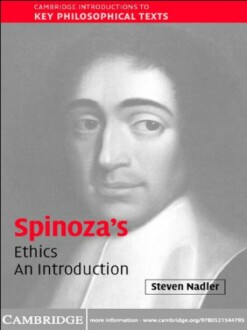Unlocking Spinoza's 'Ethics': A Comprehensive Review
Key Takeaways
- This review will delve into the significance of Spinoza's 'Ethics' and its continued relevance in today's philosophical landscape.
- We'll explore the key concepts and ideas presented in the text, and examine how they have shaped the development of ethics and morality.
- A comprehensive analysis of the book's impact on philosophy and its continued importance in modern times will also be discussed.
In the realm of philosophy, few texts have had a more profound impact on our understanding of ethics and morality than Baruch Spinoza's magnum opus, 'Ethics'. Written in the 17th century, this foundational work has continued to influence thinkers and scholars across the centuries, offering insights that remain as relevant today as they were when first penned.
About Spinoza's 'Ethics'
Written by Baruch Spinoza, a Dutch philosopher of Portuguese Jewish descent, 'Ethics' is a comprehensive treatise on ethics and morality that has had a profound impact on Western philosophy. First published in 1677, this foundational work presents a systematic and rigorous exploration of the nature of God, the universe, and the human condition.
| Historical Context | Pertinent Details |
|---|---|
| 17th-century Europe | A time of significant philosophical and scientific advancements, marked by the rise of rationalism and empiricism. |
| Spinoza's Life | A Jewish philosopher who was excommunicated from his community for his unconventional ideas, Spinoza lived a reclusive life in The Hague, Netherlands. |
Throughout 'Ethics', Spinoza employs a rigorous and systematic approach to explore the nature of God, the universe, and the human condition. He argues that God is not a personal deity, but rather a single, infinite substance that encompasses all of existence. This concept, known as 'monism', is a central tenet of his philosophy.
The book is divided into five parts, each of which explores a different aspect of ethics and morality. The first part examines the concept of God and the nature of the universe, while the second and third parts focus on the human condition and the nature of human emotions. The final two parts delve into the nature of ethics and the relationship between ethics and morality.
- Part I: God or Nature?
- Part II: Of the Nature and Origin of the Mind
- Part III: Of the Origin and Nature of the Affects
- Part IV: Of Human Bondage, or the Stronger
- Part V: Of the Power of God, or the Freedom of Man
Throughout 'Ethics', Spinoza's philosophical ideas and concepts are presented in a clear and concise manner, making the text accessible to readers with a basic understanding of philosophical principles. The book's influence can be seen in the works of later philosophers, such as Gottfried Wilhelm Leibniz and Immanuel Kant, and continues to be studied and debated by scholars today.
Check Current PriceUnlocking the Secrets of Ethics: A Balanced Review
Pros
- Clear and concise presentation of complex philosophical concepts, making it accessible to readers with a basic understanding of philosophical principles.
- Spinoza's systematic approach to exploring the nature of God, the universe, and the human condition provides a comprehensive understanding of ethics and morality.
- The book's historical significance and influence on Western philosophy make it an essential read for scholars and enthusiasts alike.
- Spinoza's concept of monism, where God is seen as a single, infinite substance that encompasses all of existence, is a thought-provoking and insightful idea.
- The book's structure, divided into five parts, provides a clear and organized approach to understanding the nature of ethics and morality.
Cons
- The book's dense and technical language may be challenging for readers without a strong background in philosophy.
- Some readers may find Spinoza's philosophical ideas and concepts difficult to follow due to their complexity and abstract nature.
- The book's historical context may not be immediately relevant to modern readers, potentially making it harder to connect with the material.
In conclusion, while 'Spinoza's Ethics' may present some challenges to readers, its significance, accessibility, and thought-provoking concepts make it a rewarding and valuable read. With its clear and concise presentation, historical importance, and profound ideas, this book is a must-read for anyone interested in ethics, morality, and the human condition.
Unlocking the Secrets of Ethics: A Final Recommendation
Having explored the significance, accessibility, and thought-provoking concepts of 'Spinoza's Ethics', we can confidently conclude that this book is a must-read for anyone interested in ethics, morality, and the human condition.
For those new to philosophical texts, we recommend starting with Steven Nadler's introduction, which provides a clear and concise overview of Spinoza's life, philosophy, and key concepts.
Tips for Buyers
- When purchasing 'Spinoza's Ethics', look for a edition with a clear and concise introduction that provides a solid understanding of Spinoza's life and philosophy.
- Avoid editions with excessive footnotes or complex philosophical jargon that may obscure the author's intended meaning.
- Take your time when reading the book, as Spinoza's ideas and concepts require careful consideration and reflection.
- Consider reading the book alongside other philosophical texts, such as those by Leibniz and Kant, to gain a deeper understanding of the historical context and influence of Spinoza's ideas.
In summary, 'Spinoza's Ethics' offers a unique and thought-provoking exploration of ethics and morality that is both accessible and profound. With its clear and concise presentation, historical importance, and profound ideas, this book is a must-read for anyone interested in the human condition.
So, go ahead and unlock the secrets of ethics with Spinoza's timeless masterpiece. Your mind will thank you!
Discover More Philosophical Texts Check Current PriceUnraveling the Mysteries of Ethics: Your Most Pressing Questions Answered
-
Q: What is the main argument made by Spinoza in 'Ethics'?
A: The main argument Spinoza makes in 'Ethics' is the concept of monism, where he posits that God is not a personal deity, but rather a single, infinite substance that encompasses all of existence.
-
Q: How does Spinoza's concept of God differ from traditional Christian views?
A: Spinoza's concept of God is distinct from traditional Christian views in that he does not see God as a personal, intervening deity. Instead, he views God as a single, infinite substance that is the cause of all things.
-
Q: What is the significance of Spinoza's 'Ethics' in the context of Western philosophy?
A: 'Ethics' is a foundational work in Western philosophy, influencing thinkers such as Gottfried Wilhelm Leibniz and Immanuel Kant. It continues to be studied and debated by scholars today, offering insights into the nature of ethics and morality.
-
Q: Are there any limitations to Spinoza's philosophical ideas and concepts?
A: While Spinoza's ideas are thought-provoking and insightful, some readers may find them challenging to follow due to their complexity and abstract nature. Additionally, some may argue that his philosophical ideas are too rigid and do not account for the complexities of human emotions and experiences.













